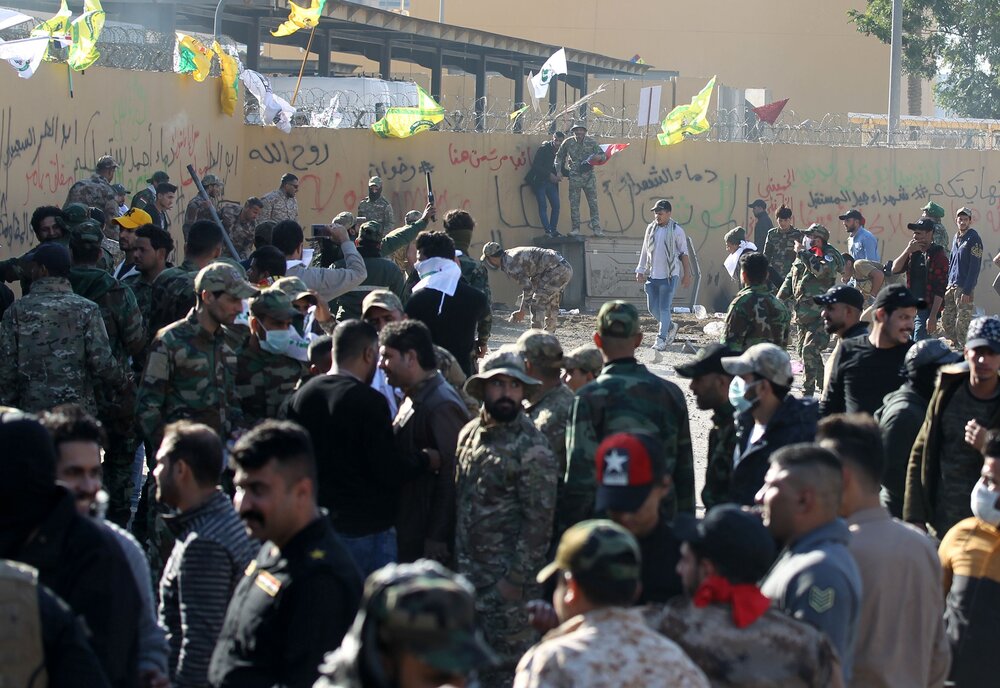Iraqis lay siege to den of espionage and terror

TEHRAN- Dozens of protesters broke into the U.S. embassy compound in the Iraqi capital Baghdad on Tuesday after smashing the main door and setting fire to a reception area, prompting tear gas and sounds of gunfire. Witnesses at the scene reported flames rising from inside the compound and at least three U.S. soldiers on the roof of the main building inside the embassy.
Iraq's caretaker Prime Minister Adel Abdul Mahdi said that crowds should leave the compound "immediately."
"We recall that any aggression or harassment of foreign embassies will be firmly prohibited by the security forces," Abdel Mahdi's office said several hours after the attack began.
Meanwhile, U.S. Embassy in Baghdad has been evacuated after thousands of angry Iraqi demonstrators gathered outside the gates of the compound to condemn Washington’s fatal military aggression that targeted Iraq’s Popular Mobilization Units (PMU).
Also on Tuesday, Iraqis held a massive funeral procession in the capital Baghdad for the victims of the U.S. air raids, which killed at least 25 PMU fighters from the Kata’ib Hezbollah faction and injured over 50 others in Anbar Province.
Caretaker Prime Minister Adel Abdul-Mahdi has announced three days of public mourning.
Thousands of angry protests managed to reach the U.S. diplomatic mission which is located in Baghdad's heavily fortified Green Zone, chanting ‘Death to America’ and burning U.S. flags.
The protesters further held up signs calling for the U.S. mission to be shut down and for the parliament to order U.S. forces to leave Iraq.
“Parliament should oust U.S. troops, or else we will,” one poster read.
Reuters cited two Iraqi Foreign Ministry sources as saying that the U.S. ambassador and other staff were evacuated from the embassy out of security concerns as protests raged outside.
Only a few embassy protection staff were left behind, according to the Reuters.
American forces deployed inside the compound have fired tear gas, flashbangs and stun grenades to disperse the crowd.
The protesters have breached the outer wall of the high-security compound. They have sprayed the words “Closed in the name of the people” on the gates of the American mission, throwing bricks and stones at the surveillance cameras around the building.
Outside the mission, Iraqi security forces fired teargas as they tried to prevent the protesters from making their way into the diplomatic compound.
Only a small amount of teargas was used and the PMU members taking part in the rallies, using loudspeakers, urged the crowd to disperse, a Reuters witness said.
The Iraqi caretaker premier called on the protesters to “immediately” leave the compound.
“We recall that any aggression or harassment of foreign embassies will be firmly prohibited by the security forces,” Abdel Mahdi’s office said.
‘U.S. unwanted in Iraq’
Hashd al-Sha'abi commander Faleh al-Fayyadh and Kata’ib Hezbollah commander Abu Mahdi al-Mohandes along with other senior Hashd leaders were among the protesters.
Speaking to Reuters, Qais al-Khazali, the head of Asaib Ahl al-Haq — another PMU faction — said “Americans are unwanted in Iraq. They are a source of evil and we want them to leave.”
Many protesters have set up tents, announcing plans for an indefinite sit-in until the embassy is closed and the ambassador expelled from the country.
Earlier in the day, Iraqi lawmakers chanted anti-U.S. slogans during a parliamentary session.
Sadr says ready to work with Hashd al-Sha'abi to end U.S. presence
Senior Iraqi Shia cleric Muqtada al-Sadr says he is willing to work with the Popular Mobilization Units (PMU) -- better known as Hashd al-Sha'abi -- to end the United States military presence in Iraq through political and legal means.
In comments on Monday, Sadr warned that he will "take other actions" in cooperation with his rivals to kick out U.S. troops if political and legal means do not work.
He at the same time called on Iraqis to avoid "irresponsible actions" that can be used to justify attacks on the Arab country.
Fighters loyal to Muqtada al-Sadr fought U.S. troops for years following Washington's invasion of Iraq in 2003.
Sadr's comments came after the U.S. forces in Iraq carried out an airstrike on a number of PMU facilities in the western Anbar Province, which led to the killing of nearly 30 people and injuring of over 50 others.
(Source: agencies)
Leave a Comment